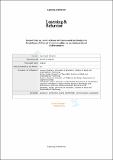Social play as joint action : a framework to study the evolution of shared intentionality as an interactional achievement
Abstract
Social play has a complex, cooperative nature that requires substantial coordination. This has led researchers to use social games to study cognitive abilities like shared intentionality, the skill and motivation to share goals and intentions with others during joint action. We expand this proposal by considering play as a joint action and examining how shared intentionality is achieved during human joint action. We describe how humans get into, conduct, and get out of joint actions together in an orderly way, thereby constructing the state of “togetherness” characteristic of shared intentionality. These processes play out as three main phases, the opening (where participants are ratified and joint commitments are established), the main body (where progress, ongoing commitments, and possible role reversals are coordinated), and the closing (where the intention to terminate the action is coordinated and where participants take leave of each other). We use this process in humans as a framework for examining how various animal species get into, maintain, and get out of play bouts. This comparative approach constitutes an alternative measure of those species’ possession of shared intentionality. Using this framework, we review the play literature on human children and different social species of mammals and birds in search of behavioral markers of shared intentionality in the coordination of play bouts. We discuss how our approach could shed light on the evolution of the special human motivation to cooperate and share psychological states with others.
Citation
Heesen , R , Genty , E , Rossano , F , Zuberbühler , K & Bangerter , A 2017 , ' Social play as joint action : a framework to study the evolution of shared intentionality as an interactional achievement ' , Learning and Behavior , vol. 45 , no. 4 , pp. 390-405 . https://doi.org/10.3758/s13420-017-0287-9
Publication
Learning and Behavior
Status
Peer reviewed
ISSN
1543-4494Type
Journal article
Description
The present research was supported by the Swiss National Science Foundation (Grant No. CR31I3_166331 awarded to AB and KZ).Collections
Items in the St Andrews Research Repository are protected by copyright, with all rights reserved, unless otherwise indicated.

